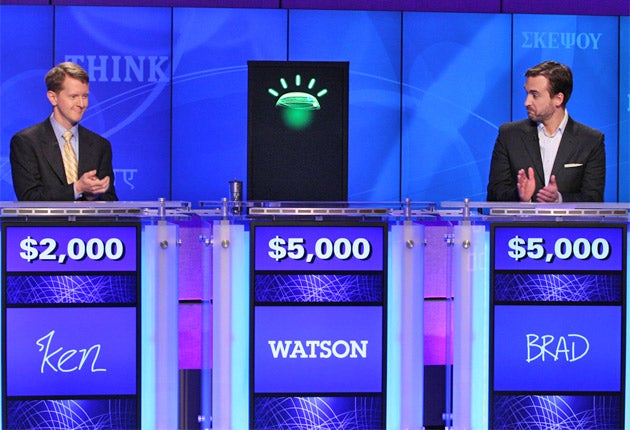Computer puts human supremacy in jeopardy

There aren't many quiz shows where the stakes are high for anyone but the participants but in the special episodes of Jeopardy! on American television this week, the hundreds of thousands of dollars in prize money are very much an afterthought. The real prize: humanity's continued supremacy in the ongoing struggle to preserve our status against computers. And, last night it was confirmed: man has been trumped by machine.
For the human race it might be the moment to concede that even when it comes to the kind of questions that seem to require an intuitive sense of meaning, computers have us licked. Probably the only people truly delighted by the result will be staff at IBM, which made Watson. For three nights this week the little box – not so little because it is backed up off stage by large servers with 15 terabytes (about 15,000GB) of RAM – has been the star guest in sitting rooms all over America. It is a clash of silicon versus synapses of a kind not since the same company's Deep Blue took on Gary Kasparov at chess in 1997.
Deep Blue won 14 years ago (although Kasparov had won against an earlier version of the machine) and Watson has not disappointed on Jeopardy!, a show that has been a staple on America's primetime schedules for 47 years. For the occasion the producers brought in the two most successful human contestants ever, Ken Jennings, who had the longest winning streak on the show at 74, and Brad Rutter, who has won the most money from it – $3.2m (£2m).
With a format that requires general knowledge on every imaginable topic with an answer in the form of a question (say, Q. Mount Everest A. What is the highest mountain in the world?), Jeopardy! would seem to present a particular challenge to a computer. A wide range of factual knowledge is abetted often by what one might call educated guesses. The very human facets of hunch and instinct are in order.
Last night, facing certain defeat at the hands of a room-sized IBM computer, Jennings was forced to concede to a bigger brain. "I for one welcome our new computer overlords," he wrote on his video screen.
It took a team of 25 computer scientists at IBM four years to come up with Watson. While the television show is mostly about entertainment, the high ratings for Jeopardy! this week also point to our long-held fascination with the notion that machines one day might be vested with artificial intelligence and begin to expand the kinds of tasks they can do.
On Tuesday night, Watson bungled what some saw as a relatively easy question asking which "US city" has its largest airport "named for a Second World War hero; its second largest, for a Second World War battle"? The monotone voice of Watson should have asked "What is Chicago?" but instead said "What is Toronto?"
"Humanity, do not despair just yet!" cried Alex Trebek, the host of Jeopardy!, talking about the mistake.
In another facet the two human champions can grab a question by interrupting intuitively and buzzing to take the question whereas Watson will only buzz when it has an answer: speed versus certitude. Mr Trebek says: "It can never ring in too early and lock itself out. Last night and the night before the guys locked themselves out nine times by trying to anticipate."
Inside Watson's 'brain'
* To the viewer, Watson looks like an oversized television. In fact, it is a far bigger machine, consisting of 10 refrigerator-sized racks with 90 servers and 2,880 processing units. Here's how it gets the right answer first:
* Watson's memory is loaded with 200 million pages of data, and draws solely on this "brain", rather than searching online.
* When a question comes in, Watson gives itself three seconds to answer, roughly as long as it takes to read out.
* The system has more than 100 different algorithms which it uses to break down clues. Each algorithm hunts for the right answer. Each solution is assigned a probability. If any answer's probability reaches a threshold, Watson buzzes in.
* Comfortingly, things can go wrong. When Watson gave "Toronto" instead of "Chicago" in answer to a question seeking an American airport, it missed the vital hint because it came in the category title – an often cryptic field it had been trained to treat as unlikely to provide essential information.
Subscribe to Independent Premium to bookmark this article
Want to bookmark your favourite articles and stories to read or reference later? Start your Independent Premium subscription today.

Join our commenting forum
Join thought-provoking conversations, follow other Independent readers and see their replies